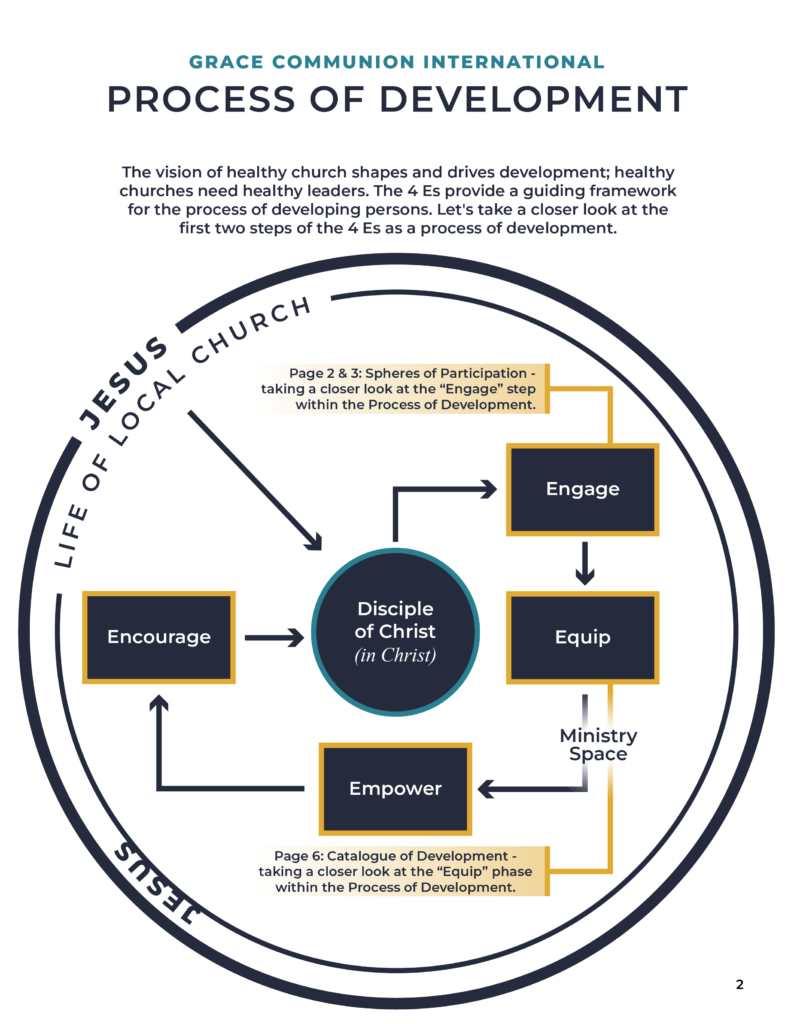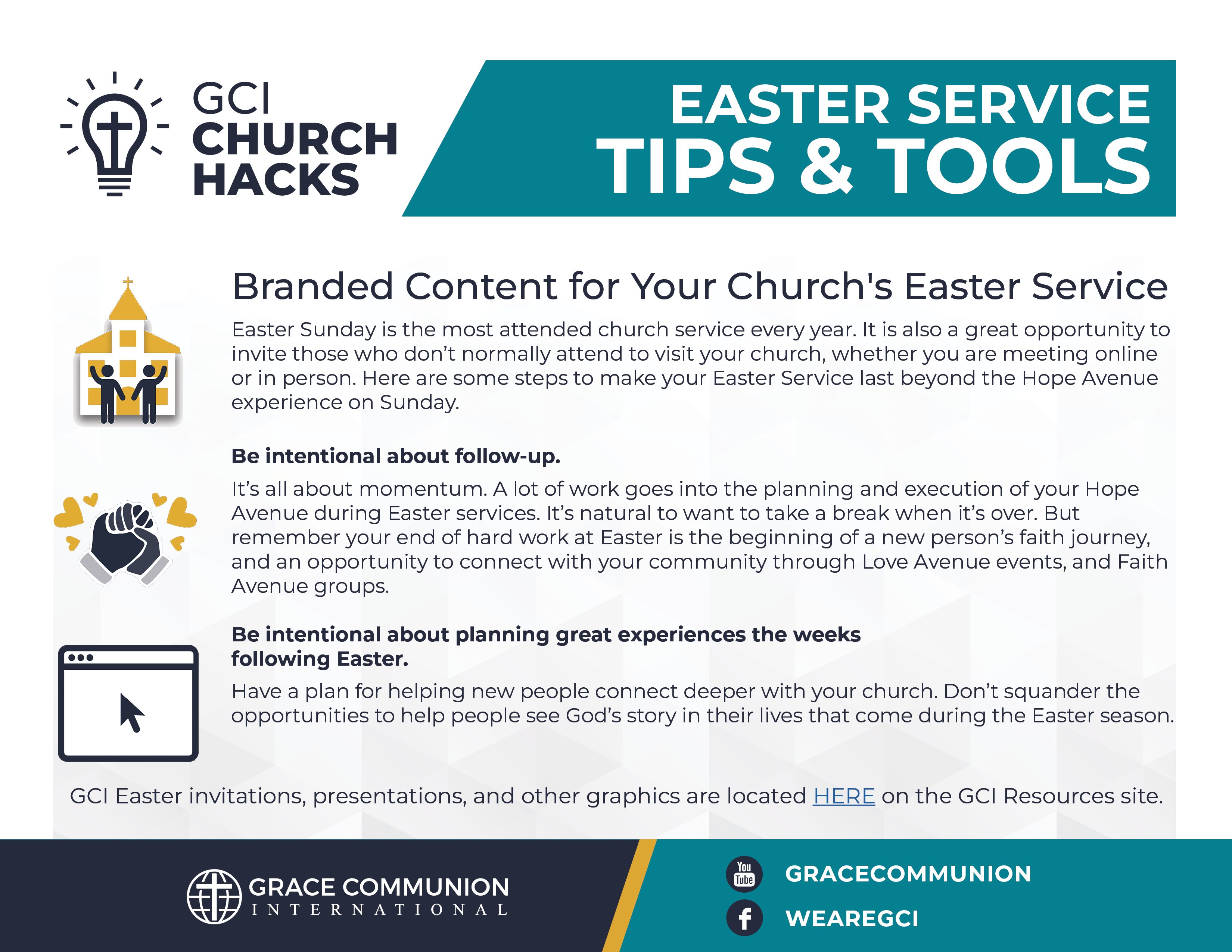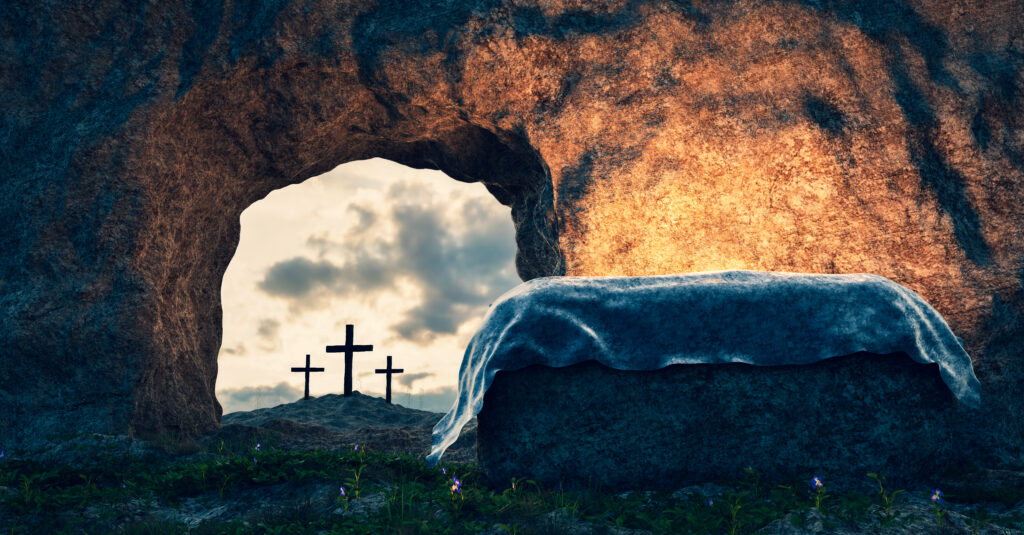Why Rhythms? w/ Afrika Mills
Welcome to the GC Podcast. A podcast to help you develop into the healthiest ministry leader you can be by sharing practical ministry experience.
Cara: Hello friends, and welcome to today’s episode of GC Podcast. This podcast is devoted to exploring best ministry practices in the context of Grace Communion International churches.
I’m your host, Cara Garrity, and today I am overjoyed to interview Afrika Afeni Mills. Afrika is part of the leadership team for a GCI church plant in Charlotte, North Carolina. Thanks much for joining us today, Afrika.
Afrika: Thank you for having me, Cara. I’m excited about today’s conversation.
Cara: Yes, it’s going to be a good one. We’re going to be talking about rhythms. And the power of rhythms. And what they can do for our development as Healthy Churches.
But before we jump in, I want to know what is one of your favorite rhythms. It could be any kind of rhythm. What’s your favorite?
[00:55] Afrika: I think right now I’ve been really leaning into learning more about different types of prayer rhythms. I feel like there’s such a big world that I didn’t know about before, and I’m really excited about learning about all the different ways that we can connect with God in prayer.
[01:13] Cara: Yeah. Oh, that’s awesome. I love that. Thanks for sharing. And rhythms do come in many different forms. We see rhythms everywhere, even in nature, in our structures.
And when we talk about developing Healthy Church rhythms, let’s just start at the basics. How would you describe a rhythm and what are some of the qualities and characteristics that you would say a rhythm has?
[01:41] Afrika: Yeah, and I was thinking it’s interesting that you just said what you said, because I was thinking in preparation for our conversation about where I notice rhythms. And I feel like God has many rhythms. Like you were talking about—it’s seasonal rhythms. And we have sleeping rhythms and cardiac rhythms and or even like just gestational rhythms and like the process development of life.
And for me, when I think about rhythms, some of the qualities, it feels like it’s not always the same. there are some times where there are certain features. If we think about seasons, for example, right? There are certain things we come to expect when it comes to winter.
It’s a different experience now that I live in Charlotte than when we lived in Massachusetts. But winter brings a certain type of flow, like it tends usually colder. And there’s not as many leaves on the trees. But then we think about moving into spring and starting to see things bud and grow and getting really to enjoy the fruits of things in the summertime.
And then even in fall when things began to die, it’s actually a beautiful experience because the colors are so gorgeous. And we’re preparing to enter into another cycle of those rhythms.
I think that rhythms have some common elements, but then they also have some things that are different, but that they feed one another, or they connect with one another. And I think about that same thing too, when it comes to our relationship with God and with one another, right? It doesn’t have to look the same all the time, but there’s so much richness in the different parts of the different rhythms that we lean into.
[03:16] Cara: Yeah. That’s excellent. And I love how you describe that balance of there’s some things that are common and maybe, a pattern or however I might think of that. But then things that are different too. And one of the images that comes to mind for me when I think of rhythms are ocean waves.
There’s a little bit of this push and pull of rhythms. But waves aren’t always the same strength, same height, same anything. But it is still a rhythm, this push and pull.
[03:46] Afrika: And they each have their own types of beauty. And that’s something I used to—we’ll probably get into this more as we talk more. But I think I’ve also thought in terms of like a good / bad binary.
Where it’s just okay, winter’s bad, right? Winter’s bad, it’s cold, everything’s dead, right? You don’t really want to go outside, unless you really enjoy that weather. But it’s not bad. It’s just different.
You have a different flow and an experience with that, but actually pretty cool things are happening in the winter. That cold and how it sucks ceiling in the soil and the things that are happening that we might not be able to see. I feel like it has such alignment to what happens in our spiritual lives. We may not see exactly what’s happening, but something is happening.
[04:31] Cara: Yeah. Oh, that’s really good. Yeah. And that leads right into the next question that I have is, what do rhythms do? What are they for?
[04:42] Afrika: Yeah. I think about in some of like in the examples of rhythms, one of the things that have come to my mind, especially in our practices as a denomination, thinking about like the worship calendar. And I think of those as rhythms as well. I think we all do. Even thinking about being in Epiphany or being in Easter Prep or being in Easter, Ordinary Time, and things like that, I think it gives us almost like an anchor. And an expectation that this is the posture that I want to approach this time with. And we don’t know exactly what God will reveal to us during that time, either directly in our time with Father, Son, and Spirit or with one another.
But I think it gives us something to look forward to and almost a container in which to hold the experiences that God’s going to bring into our lives. And I think it’s anticipatory. So you happen to know, this thing is coming, and I’m really excited about what is it that God’s going to reveal to me in this time?
And I think it gives us something, not only a regularity or a pattern, but also surprise in that. How fascinating God is—there’s mystery in the rhythms as well. It’s not to say that we know exactly, like every year during Epiphany God does exactly this. No, God surprises us all the time, but we know the themes that we’re thinking about. We’re thinking about new life or we’re thinking about celebration or light or preparation or celebration. There’s many different things.
So, we can look forward to different things, but also have that space for mystery about what’s actually going to happen during that time. We don’t know for sure, but it’s exciting.
[06:26] Cara: Yes, and I love the phrase you use, a container for whatever it is that God is doing in that season or that we focus on what God has done. And how there’s also that space for mystery in that container. Because even that example that you give of the seasons, it’s the same thing, right? If you live in a climate where you have four seasons, the seasons are predictable. But one tree in Fall, one year, can be a bright orange and then the next year, maybe it’s red. And the next year may be brown. And the seasons are reliable in that sense. But they look very different every year.
And it’s to think about the worship calendar that way too. We come back to every year, Easter preparation. We come back every year to Advent. But what God may be shaping in us as we focus on that aspect of who he is and who we are and Him might be one year a little bit bright orange and one year a little bit deep red.
[07:30] Afrika: Exactly. And I love that. I mean that surprise element that’s in there that I feel like God constantly brings us into. And I think the other piece too is that I’m somebody who is I want to understand something, and I want to have a solid understanding of it. And once I think I understand— I’ve been leaning away from this now—but my default setting is to just be like, yeah, I know this thing.
But I think the other piece about rhythms is just you may think you know that thing, but you might not quite. Before I really understood and studied about what actually happens during season, I thought I had an understanding. I grew up in New York City, winter looked a certain way, spring looked a certain way. There are certain things that would happen or that we could anticipate.
But the more I started to learn about seasons, I’m like, oh, I actually have no idea; I’m just thinking about, okay, flowers are growing. Or my big thing when I was a kid was when Forsythias would be out. That would be something I would be excited about.
So, I understood it from a certain perspective, but then as I started to study more about trees or the life cycle of a plant. Oh, there’s a lot of stuff, a lot more things that I don’t understand yet.
And even in the things we anticipate in a rhythm, there’s still that element of surprise in it too, as we deepen our understanding. And I think that’s a really great place to be with God.
[08:46] Cara: Yeah. I really like that idea of going deeper in those rhythms. And one of the things that makes me think of is I can experience rhythms as formation too. And part of that is because it brings us deeper as we revisit certain things, revisits certain places. It’s almost even that image of the spiral You’re revisiting, but maybe you’re going deeper each time.
[09:10] Afrika: That’s such a good point. Yeah. And I feel like the question you asked me earlier about which rhythms am I thinking about now, so much so true with prayer.
Because when I was a kid, it was more like, all right, let me pray to God for forgiveness because he’s probably mad at me. Let me ask for stuff like treating God like Santa Claus or like a genie. It was prayer is just asking God, because you know the scriptures say, ask, and seek and knock and ask for what you want, it’ll be given to you. And it’s like you have a certain individualistic perception of that.
But then I think now, as I’ve been learning more about the different types of prayer—not to say that, supplication is not part of that, right? God wants to know everything that’s on our minds and things like that. But moving beyond okay, I understood intercessory prayer, but then also the different like silent prayer or listening prayer.
One of the more recent ones I learned about was soaking prayer. And I feel like the more I learn about this rhythm, the more there is to learn. And it’s connected, but also distinct in a lot of ways. And it’s like you’re saying, that spiral of going deeper and really having something become a part of you.
[10:21] Cara: Yeah. I like that. Some of the things that rhythms can do for us is it brings us deeper; it gives us that container to hold both a mystery and the intentionality of a particular season. And be transformational in that way. Yeah, I love that.
And when we think about Healthy Church rhythms specifically, what are some examples of Healthy Church rhythms that come to mind?
[10:47] Afrika: I’ve had the wonderful pleasure of being part of a School of Formation since for the—it’s an eight-month program that’s actually part of New Life Fellowship in New York City. It’s a cohort basically, that you can participate in where we take a deep dive into—Rich Villodas is the pastor of that church and also the author of The Deeply Formed Life.
And we’ve been really deeply leaning into several things like contemplative rhythms and internal examination and really thinking about all these things and what they mean to us as Christians. And I think especially when it came to the contemplative rhythms part. Thinking about Sabbath keeping, as soon as we started talking about that, I’m like no, no! Rich, please, I don’t want to talk about Sabbath keeping because my experience as a younger person with Sabbath keeping was not enjoyable at all. It really felt not punishment, so to speak, but it just felt drudgery.
It was a time when you can’t do anything fun. You can’t hang out with your friends; you can’t watch anything that you enjoy on TV. You can only watch nature programs. I remember just because we would observe from sunset on Friday to sunset on Saturday, and it just wasn’t enjoyable.
But when I started, I’m like, okay, let me not bring that into the experience. Let me actually lean into learning. What is God’s intention? What is his heart behind Sabbath keeping? And I was like, oh, this is beautiful, being able to have this period of rest, and enjoyment of not only our time with God, but in community with one another.
And even it’s shaking up my previous perceptions of different types of rhythms and practices. I think when it comes to Healthy Church, I think that’s the piece too, like we were talking about just now, taking a deeper dive into somethings. One of the concepts that came to mind for me as I was learning, or that was a part of our learning was that, thinking about God, when he created began human life, the very next day was a day of rest. And they were created and then brought into rest, and I was like, yo! So, I’m like, let me think about this. That means something.
I think about when it comes to Healthy Church, in order to embody all the things that we know that Jesus has invited us into, whether it be how we’re living out with intentionality the Faith Avenue or Love Avenue or the Hope Avenue, it really comes from a place of our own connection with God.
And I think it’s twofold. It’s that we have these times, these rhythms that we enjoy with God. And it could be in silence and solitude. And even thinking about “solitude” feels a bit different for me because I’m not completely alone because Father, Son, and Spirit are persons, and I’m spending time with them.
But it’s not just meant for me to enjoy as an individual only. I bring that into communion with the larger body. And then we bring those things that we are doing with God—whether it’s keeping Sabbath, or our prayer rhythms or things like that, or the slow reading of Scripture like Lectio Divina, or even thinking about Visio Davina, (which is a newer exploration for me).
I think all of those practices individually and then collectively, they are leading into, they’re the pathway or the on-ramp, so to speak, into the components of a Healthy Church. And I really feel excited about that because I’m learning a lot more about not seeing my relationship with God as it’s just me and him. Jesus is my personal Lord and Savior.
I used to say that for a long time. Yes, you are in relationship with Jesus, but oh, there are all these other children that God wants us to be in connection with too. I think being able to lean into our rhythms individually and then with one another, I think really feeds all the components of a Healthy Church.
[14:52] Cara: Yeah. That’s a beautiful thing that you’ve described because one of those rhythms of a Healthy Church is coming together in spiritual practices corporately as the church. And not just, on our own, in our own little corners and spaces and then just coming together for maybe activities as a corporate body or just a Sunday worship service. But how are we coming together fully in our discipleship, all aspects holistically, one with another and sharing with each other what we’re learning from our own formation times and rhythms? And how does that impact one another as we participate communally as the church?
[15:37] Afrika: Yeah. Yeah. The image that just came to mind for me just now as I was listening to you is like thinking about the main body of a river, but then also the tributaries that could flow into that main river.
It’s thinking about individual time with God is like those tributaries, right? But then there’s the main flow; we are bringing what God is forming in us into that main flow. And in that way, we get to really spread the aroma of the kingdom, which is so needed, so needed!
And one of the things I was thinking about yesterday was—especially with that piece around being the aroma of the kingdom of God—it’s like when you think about a concentrated aroma, that could be bad, right?
I think about sometimes when—and now let me be real—when Dishon is cooking, not so much me. But with Dishon’s cooking and we’re frying something or making something. If we’re doing it inside the house, sometimes the smoke alarm comes on because the smoke is in the house and it’s a lot, but if we’re grilling outside, not only is it just okay, everybody else in the area gets to smell that good smell and maybe it awakens the hunger in them, or they get to enjoy the aroma. But if we’re just having it in the house only, it’s overwhelming and it’s not really fulfilling its true purpose, which I think is to create an invitation almost. I think about that too.
[16:56] Cara: Yeah. I really like that analogy, and it makes me even and think about, when we talk about Healthy Church rhythms, I think being in rhythms of mission. (And we’re going to talk about that on a later podcast in a couple of months.) But are we sharing that aroma? And it does come from—I think what you’re saying is that—that foundation of are we being formed? Are we being discipled together as a community? And then, what happens as an overflow from that? How are we joining in what God’s doing as he shapes and forms and transforms us as his followers. And maybe we are grilling outside and letting the neighborhood smell a little bit and get a little bit hungry.
[17:46] Afrika: Yes. Absolutely.
[17:51] Cara: No that’s really great.
And then, I think an important thing to note is, again, that foundation of when we think about Healthy Church rhythms, it is grounded in who God is and who we are because of him. And those spiritual practices personally and corporately are really important because otherwise rhythms can become just activities of the church rather than rhythms that are rooted in what God is doing in our midst because of who he is and who he has called us to be as our church. I really appreciate the way that you rooted that answer. Not just, rhythms are you got to make a calendar and you got to do this and you got to do that, because those are ways …
[18:39] Afrika: And that’s part of it.
[18:41] Cara: It is. It is, but that’s secondary. It’s the rhythm of who God is and who he’s created us to be. Our primary rhythm is, are we in step with him?
[18:49] Afrika: Right. And the thinking about God’s purposes, and God’s desire and his heart. And I think, there’s much—and I’m speaking for myself—there was much of a misunderstanding about who God is for much of my life. And for me it feels really exciting to be able to think about, what do rhythms in the Healthy Church look like?
And then for me, when we’re thinking about the gospel is good news, for a lot of my life as a Christ follower, I was like, this doesn’t feel like good news. I don’t really feel like I want to talk about this because it feels actually scary. But then actually getting in those spaces, in those rhythms, in that depth of communing with God, both in time directly with him and with one another, we’re really getting to discover, who he really is, who [is] Father, Son, and Spirit.
What does that mean? It’s so beautiful. It’s not scary. And it was really refreshing for me to learn. It’s actually a really beautiful relationship that we’re invited into.
And I think too one of the things that’s been helping me, even in my own time with God is— because I’ve used the term myself and heard the term, sacred imagination.
And I’m drawn to that. And even in that time of slow reading of Scripture and placing ourselves in the story. But I think also, the blessing of the work that other people have been brought into as well, like watching The Chosen as a show, really seeing the way that they depict Jesus is beautiful. So that too, really being able to enjoy that. For me, I could watch The Chosen alone and be like, this is beautiful. Or we can really enjoy—doesn’t have to be the watching of the show, but like really leaning into, how do we together envision what it is that God has said and what he is saying. Yeah. I love that too.
[22:44] Cara: Yeah, so much richness bringing even our life rhythms together as the church and the life rhythms of our neighborhood. I love that.
Another thing that—because it sounds like we could go on about that forever. Another thing that we do talk a lot about in GCI, one of our mantras is High Support, High Challenge–Grace Always. And how can the use of rhythms and paying attention to our rhythms provide us both high support and high challenge as we grow in Healthy Churches?
[21:21] Afrika: Yeah. I’m actually going to flip it and talk about high challenge first because I think that one of the things I’m noticing as I’m learning more and studying more and really leaning into learning about rhythms is that it really does shake us up. There are certain ways that we are used to being.
And then think about the word formation. This is something that I’ve learned from Michelle [Fleming] quite a bit. We’re all being formed. But what’s forming us? I think about that too, as we are thinking about, if we are learning about okay, Father, Son, and Spirit, we are invited into deep rest. What does that look like?
And sometimes that’s going to look a bit different than we maybe have been used to practicing. For example, one of the examples is in being in the School of Formation and hearing, how do y’all as a whole church practice Sabbath. Or even like Ruth Haley Barton’s recent book, she’s talked about all these different practices before, but her most recent book is about embracing the rhythms of Sabbath and sabbatical.
And if we believe those things, what does that actually look like practically? Because we are in a society that is largely formed as pretty antithetical to those rhythms. I think the challenge might even be for all of us as a group to say—and one of the examples that we explored in the School of Formation was, what if someone has three jobs? And they need to work those jobs to take care of their family. And they really have a hard time being able to enjoy Sabbath.
And it’s even then to start to look at, what is our economy? How do we as a body support those, like in Acts, like those who gave to those who didn’t have, and everybody had enough?
And what does that mean if we believe that there are certain sacred rhythms that God is inviting us into? What are in our practices that we need to do away with or that we need to question? If we want people to be able to enjoy time in having solitude or time of retreat or time of really slow reading into the word, are we as a denomination, as a body, are we creating the conditions for which we can do those things well?
And that’s the reason why I wanted to talk about challenge for us because I feel like we have to lay that foundation. And then we’ll be ready to provide the support.
Because for me if someone—I’ll just use myself as an example—if someone’s like, boy Afrika (and they’ve given me a whole bunch of stuff to do) but you should get some rest. I’ll be like, I don’t think you really believe that. You keep giving me more stuff to do, and it’s going to be harder for me to get rest.
But if someone is just, you know what? You really need to have time to rest. We believe that this is what God has intended for us, that we can be whole, and that we can be spreading the aroma of the kingdom and we’re not exhausted and burned out. And how do we make sure that we can do those things?
So I think the challenge is to make sure that the foundational practices are there. And it’s not a challenge for people to be able to lean into. That’s what comes to mind.
[24:19] Cara: That’s really excellent. Because when we think about things in terms of rhythms rather than just, oh, we’re just going to do things the way that we always done them or whatever, willy-nilly go on about our lives as a church, then we will get faced with these tough questions. If we are committed to this rhythm that we believe God has invited into, what does that actually mean for our lives and how we move? And what it means to be committed to this rhythm that God has invited us into.
And how do we need to be transformed to walk in step with this rhythm?
[24:56] Afrika: Absolutely. Because I think about that a lot as far as how God’s been shaking up my understanding in the most beautiful way. There’s many things in the scriptures that we read and we’re like, oh look, Jubilee, that’s such a beautiful thing. Oh, that was then, we can’t do that. It doesn’t have to be old. We can with intentionality start to look at, what is God’s heart around Jubilee? And why does that exist and how do we—that’s part of the aroma of the kingdom as well—how do we make sure that we are living out these practices?
Because I feel like it connects to everything, but we’re not going to be able to share the love of Jesus with people who, if they look at our lives and they’re just like, you’re always stressed out, you don’t seem like you really have time for joy, fun, or a celebration. It seems like you’re just working, and that doesn’t really feel like good news, going back to that concept in order to be really compelling.
And that’s not to say that’s our aim, but if people look at our lives, do we reflect the rhythms that God invites us into? Or are we of that mindset to be like, oh yeah, that’s what God used to do in the Old Testament. We don’t do that anymore. Actually, we could. What does that look like? What does it look like to support one another?
[26:10] Cara: Yeah. And when you said reflect the rhythms, it makes me think too, part of that challenge is, are the rhythms of the church reflective of the rhythms of the kingdom? Or the rhythms of the world?
[26:20] Afrika: Yes. Yes, absolutely.
[26:21] Cara: And that is a beautiful and a challenging question to ask ourselves because transformation doesn’t happen overnight. But it is a journey, a beautiful process.
[26:32] Afrika: Yes, absolutely. And I think that’s the piece too, is that sometimes when we—and I see this in the work that I do—often when we come to a realization, something we would like to see change or to be different, we want to jump right to the full change.
But no, you can’t do that. And going back to the seasonal rhythms, you don’t go right from fall into oh, look at this mango tree. There’s some things that need to happen before the fruit’s going to be there, right?
So I think giving ourselves—and I want to be careful to say not giving ourselves an out to say, oh yeah, this is hard, it’s going to take a really long time. It’s not just taking a long time because on the human level we feel like we can’t do it, because it shouldn’t be us doing it.
It should be that we are participating with Father, Son, and Spirit. In what, Father, Son, and Spirit are already doing. And just thinking about, here is what we aspire to do, and then here are the steps that we need to take to lead in that direction.
And then hold ourselves accountable for: we believe that this is God’s intention, and how are we participating?
[27:39] Cara: Yeah. Yeah, that’s good. That’s good. And I’m wondering—and this would’ve been me maybe in my earlier days because I love to be free.
[27:55] Afrika: It’s that Enneagram seven energy.
[27:58] Cara: Yes, it is. What would you say to those who might be concerned that rhythms could keep us maybe locked into too strict of a structure …
[28:10] Afrika: or like rigid.
[28:11] Cara: Yeah. Yeah. And more importantly, might keep us from following the lead of the Spirit , because we’re too committed to the rhythm itself. And as a follow up to that, what are some ways we can discern rhythms by the lead of the Spirit?
[28:27] Afrika: Yeah. I would say the first thing that comes to mind is what we were talking about a bit earlier, is that yes, it is a container. The rhythms are a container, but we’re not to say exactly what the container is going to contain. It is a container, but there’s that mystery piece.
And I think it’s really helpful—this is something I’ve also been learning a lot about, which has been really refreshing—is that in participating with Father, Son, and Spirit in rhythms, it’s not meant to say that we all become like these automatons, like yellow pencils; we’re all in lockstep with one another and there’s no variety. Because one of the things I know well, and I think we all know well about God is that God loves diversity. And he created us with different personalities, different experiences, different inclinations and ideas, and the way that we experience the world, for a reason.
And I would say that a container is not meant to be something that is restrictive. But it’s meant to be something where we are going into a flow with one another, and that God is going to be doing something very particular with us in the way that looks.
He’s going to let us know, and he’s going to bring that in and through our different personalities and our different interests and things too. And I think part of it is making sure, and this is another thing that’s a big part of my work too that I do, is that a lot of times we get an idea about something and we’re like, ooh, this is how it will manifest in a really good way.
But we don’t really ask for input from people who are going to be participating. For me, I would say, I think it’s really important to. Say even thinking about the worship calendar, we are entering into a season of Epiphany or into Easter Prep. What is God saying to you about that time?
How are you enjoying God and are there parts of that you can share in the body? Because there’s many people who might be spontaneous and not want to be locked down either, but feel like something’s wrong with them. But then getting to see somebody who has that same type of inclination, it’s oh, that’s how that could look for me.
And that’s how other people might benefit from it too. I think that’s the communal nature of a rhythm is that let’s all talk about it together. And just in your time with God, what is God saying to you about how he wants you to embody this time?
And then how can we flow in that together? And I think for some people who are like, organization and structure, that can feel a bit scary. But it doesn’t have to. I think because there’s ways to contribute from all of our different ways of being.
I think that if done well and done in collaboration with one another, because we are the body, that could be a helpful type of perspective. And then tell me again the second part of the question.
[31:13] Cara: What are ways that, we can discern rhythms by the leading of the Spirit?
[31:18] Afrika: Yeah. I think one of the things that has been really beneficial is really thinking about what is discernment. And I think another piece that can be really hard—and it’s something that I’m—this is not from me. I’ve been actually listening to a podcast that has really been helpful in thinking about what does it mean to be with God and to listen to God and to communicate with God in prayer.
And some of the caution around that, that people might feel is because sometimes things have been done that have been abusive or manipulative in the name of God. Okay, this one person God told me this about you. And it’s just oh, he didn’t tell me. So, either you’re saying you’re more spiritual than me and something’s wrong with me, or I can’t trust you.
I think that discernment piece is being able to be together in community to say, let’s enter into a time, an intentional time, of here’s what we’re seeking God for and let’s do it together. Let’s pray together. When you are having your time, have this be a part of your focus and let’s regather and trying to be intentional about that.
The time to do that, if you’re trying to think about that in an Advent rhythm, is not necessarily during Advent. So being a bit planful about it and anticipating that time, but really seeing what it is that God is saying because God is not going to say one thing to me and then say something completely contradictory to you. And I think this is really being able to, one, like we were talking about before, get our own individual rhythms into a place where God is speaking to us and we are hearing from him. And then also being able to bring that together in community and to seek God together.
[32:57] Cara: Yes. And I think that’s a really important point that you make that say in the worship calendar, where we’re doing planning and discerning what that looks like as a church community to celebrate Advent. When we’re following those rhythms, we know what to expect when Advent’s coming up. It gives us the opportunity to discern collectively or on our team what that’s going to look like, what that can look like.
And we can corporately be discerning versus if we don’t follow a rhythm, then we don’t necessarily have the heads up to discern together. And then we default to that, oh, I woke up this morning and I decided this is what the “whatever” is going to look like today. And I think that’s a great opportunity to come back to that point of we’re doing this together in community, discerning together in community. And at the end of the day, it is God that we’re following. It’s not the rhythms themselves.
You mentioned at the start of our conversation, God’s got rhythms everywhere. That’s another aspect, rhythms aren’t antithetical to how God works. And yeah, I think that’s a beautiful thing that it gives us the opportunity to allow us as the church to participate more corporately, in that discernment about what this will look like to live out these rhythms.
[34:26] Afrika: Yeah, and I think that, it definitely helps too because one of the other things I’ve been thinking about a lot lately is I can’t even say how many different spiritual gifts inventories I’ve taken. They usually tell me the same thing and just okay, yes, Afrika, you have an administration gift, and you have a mercy gift, and you have the gift of discernment. And I’m usually, great, that’s good to know. Not really sure what that looks like.
And I think that piece of it too is really being able to—when we incorporate those types of rhythms with one another, it gives us the opportunity to develop the gifts that God has given us in the body. Not in just a way of identifying gifts, but actually like flowing in the gifts that God has given us because that’s the benefit of being a body.
And if we are getting together corporately, and you share something with me that God said to you, I’m like, I never really saw it like that. And that’s really very helpful to me to consider how God is revealing it to you and how it could even enrich me. And it could be a mutual experience.
And I think that piece of the mutuality of a communal space is important and also very challenging because we are in a context in a society that is very focused on individualism when it comes to our relationship with God. And that’s not the intention.
[35:50] Cara: Oh, that’s good. What are some more benefits of a rhythmic lifestyle of the church over maybe spontaneous or unplanned activity?
[36:06] Afrika: I would say the benefit of having it be more planned is that people can intentionally participate. If I’m just like—not to say this’s not a space for spontaneity because I think that there should be. I think that it can be good.
Also, that when we think about if we want to be able to invite people to participate, people need the opportunity to know that it’s going to happen and to plan for it. And I think that’s the piece too. It’s not meant to be something that’s limiting, it’s actually meant to be something that frees as many people up as possible to participate.
So if someone—this has happened quite a bit where I get an email just tomorrow this thing is going to happen. I’m just, I actually I can’t do it. Not because I’m not interested, but because I already have something planned for that day. And I think that really being able to create space for people to find out about an opportunity and to participate and to planfully participate in it. Because I’m not at this stage of life anymore, but there was a stage where, our children were younger. And if maybe it’s an event that’s not necessarily for everybody, say it’s for maybe adults or whatever, I need to make sure I have childcare.
Or I need to make sure that if it is a family event, that whatever’s being offered is going to be something that my child is going to enjoy so I can get them ready. I think it gives us an opportunity to be planful. But then also folks who really enjoy a bit more spontaneity, you connect with one another and then y’all can really be able to enjoy that too.
But I think if we are operating more like that than actually giving people the opportunity to join in, then it makes it hard for people to participate. And we are putting up unnecessary barriers.
[37:49] Cara: Yeah. And that if we go back to even that idea of container maybe the better comparison is rhythmic versus arrhythmic because there is room for spontaneity within rhythm.
[38:01] Afrika: Absolutely. Yeah. I think that when we have that opportunity to invite one another in, it’s really important. I think especially something that I think about too, is in our different personalities. I’m someone who, I need a moment to process.
And so when I see an opportunity, I’m not typically going to be “yes” immediately. I got to think about that. Let me take a look. And giving people who need an opportunity to prepare, and then also folks who may not need that as much, to understand folks who may need that space a bit more.
[38:35] Cara: Along those lines of creating more space for participation and kind of orienting ourselves towards others and the corporate, having a rhythm helps us to create that space. Because for an example, as a leader, if I were to do all of my sermons for a year without following a rhythm of the worship calendar, me, who I am and the life experiences that I’ve had and the passions that God’s given me, I am going to focus majority on particular aspects of who Jesus is and his kingdom because I’m one piece of the body. But when we have rhythms that cover the whole story, that gives opportunities, one for me to step out of me, outside of myself and tell the whole story, not my story of who I’ve experienced God to be.
But then also to invite others into that experience of, let’s tell his story together. Because if it was me, I’d be preaching Advent and Easter, Lent or Easter preparation the whole year. But that’s only part of the story of God and his people.
And I think that’s part of those rhythms too, is we get to focus on the bigger story and as leaders it brings that challenge of, we got to step out of that, step out of ourselves a little bit and more into what is God doing? And how is he doing that in the midst of all of us as body?
[40:19] Afrika: Yeah. And I totally agree because I’m the same way. And I think before starting to learn how to practice Lent differently, I used to be like, oh no. Because of my former impression of Sabbath, my impression of fasting or thinking about that time, oh, it’s such a melancholy time; I’m really trying to have fun.
I don’t really want to be thinking about this or giving something up, or whatever. It was a very limited way, an inaccurate way of thinking about that time. But then as I’m seeing people in the rhythm of our worship together, sharing their perspective and their experience with it, I’m like, oh, I don’t have to see it that way.
Because I’m actually having a more expansive understanding of what it is. And actually, it’s different. It’s different than what happens during Advent or Easter to a certain extent because they have their different components and different purposes. But we get to see the connectivity of it and the things that we might not gravitate to immediately, we can actually unpack what are some of our misperceptions about that thing and to grow an appreciation for that.
And it still might not be our favorite part of the calendar, but we can grow, like I was saying, to appreciate it because it’s valuable.
And there’s beauty in all of it. It just manifests a bit differently. We get to really benefit from one another’s experience with the different parts of the rhythms that God calls us into.
[41:46] Cara: We’re coming up on the end of our time, I have one more question for you.
What advice would you give to those of us who are starting to build Healthy Church rhythms personally and corporately?
[42:02] Afrika: I think, not to just be like, I want to plug this book, but because it’s been beneficial to me. Really, The Deeply Formed Life has been really helpful for me.
I don’t mean to say this book only, but as an example of a book that could—and I’m a book person, there’s that also. If it’s not a book, maybe a pod, there are podcasts too as other sources. But I think really being able to lean into something that is really focusing on formation.
One of the things I enjoy about the way that book is structured is that it has five different practices that we’re thinking about. So, it’s like, here’s the teaching about this practice, and then the next chapter is, let’s unpack that—unpack our experience with it, unpack why that’s meaningful, unpack why how that benefits us spiritually.
So that has been really, really very helpful for me because going back into how I was formed from the beginning, from being a little kid, it matters and not in a way of being like, oh, I want to go back and bash my family. Not that, because everybody has the beginnings of your formation about different things.
But I really appreciate the way, the vulnerability, that Rich Villodas uses, implements as he’s writing and the things that he’s learned and being able to say okay, what are some of the scripts that are in your mind, or some of the things and patterns that you notice generationally or in your own upbringing? What are some of your perceptions about God and how can the Holy Spirit really help you to really heal from some of those things?
And to address and let God work you through some of those things that might be a barrier to you, and it invites you into this wide-open space. And I don’t know how many people have watched the movie The Wiz, which is the Diana Ross, Michael Jackson, Quincy Jones version of The Wizard of Oz.
But there’s a scene—and it’s a spoiler, but the movie came out in the 70s, I don’t really feel bad about it. And plus, it’s kind of similar to The Wizard of Oz. But there’s this one scene where Dorothy and the Tin Man and Scarecrow and the Lion, they’re going to confront this evil queen.
And there are all these people that she’s enslaved and they’re in what looks like really pretty grotesque suits. And they’re like, boy, they look rough, you’re looking at that. And then when they’re liberated from that evil queen, they basically unzip themselves. And that grotesque suit that they have on, that wasn’t really them. It falls away and they’re like beautiful underneath. And then they are dancing and the whole song there is A Brand New Day song.
And I feel like that. I feel like that about being able to uncover what are some of the things that hinder us. What are some of the things that have blocked our true understanding of who God is and how do we help?
How do we put ourselves in a space where God can unzip us and be like, here’s your true self? Here’s who I made you to be, and here’s the formation that you need to get to that self, those opportunities.
And I think whether it be The Deeply Formed Life or some other type of source, but really being able to take a deep dive into different understandings of different ways of connecting with God and doing that work.
It’s not easy, but it’s important and so that we have less barriers to connecting with Father, Son, and Spirit. o that’s been an incredible help to me and I think it could be beneficial to other people.
[45:19] Cara: Thanks for sharing that. Afrika. Yeah, this has been a really, wonderful, enriched conversation.
I am glad you’ve got the time to join us today. But before we close out, I’ve got some fun questions for us if you’re ready.
What would the title of your autobiography be?
[45:43] Afrika: Oh, I feel like I’m cheating because I just started an LLC. [Limited Liability Company, a business structure in the US] And the name …
[45:50] Cara: OK. Yeah. That’s alright.
[45:51] Afrika: No, I’ll just use that same one because I think it’s clever, but it’s “Continental Drift,” because I’m named after a continent and it’s my drift, my perspective. It’ll be Continental Drift.
That’s what I think of now, but it’ll probably have something after the colon as well, the subtitle.
[46:08] Cara: Yeah, I like that. All right. If you could bring back any fashion trend, what would it be?
[46:13] Afrika: Oh, I’m not into fashion trends and that’s going to be really hard for me because I’m like anti – fashion trends.
None of them. Because I really feel people should be able to express themselves, within reason, express themselves in a way that really resonates with them. And I feel like a trend is, no disrespect, but it’s much like copying off of someone else. And if that’s your thing, that’s your thing.
But if you’re just doing it to fit in, then I’m like, oh, that’s kind of corny. I’m like, I don’t think I would, no trends.
[46:46] Cara: No trends. That’s fair enough. That’s a legit answer.
What fictional world or place would you love to visit?
[46:54] Afrika: Oh, I feel like I really would like to be a student at Hogwarts.
I am such a big Harry Potter fan, and I’ve thought about it too. I have done the whole, like the tests and what house would I be in, and I tested and said I would be in Gryffindor. I don’t think that’s true. I’m totally a Hufflepuff and I’m proud of it. It’s really fine. But yeah, it just seems like such a fun place to go to.
There’s a lot of stuff going on there. Typically, when there’s not some type of intense thing happening, it seems like a really cool place to go to school and to just have shared meals and hang out with friends. So that fun part of Hogwarts when there’s not like drama going on seems like it’d be fun.
[47:35] Cara: Yeah, I like it. I like it. Yeah. All right. This one’s fun because you’re from New York. What’s the best phrase or piece of slang that people use in your hometown?
[47:46] Afrika: Oh. This is so hard because what I’m going to say is not to say that this is New York only. Because I actually don’t know where this slang came from, but I love saying that something is dope, and I think sometimes people just like dope? If you, depending on your understanding of the word or what you perceive, you’re like, oh, that’s a terrible thing to say especially as a Christ follower. I’m just like, no, I don’t mean that. It’s cool. I’m like, I used the word dope a lot. I like that.
[48:10] Cara: That’s a good one. That’s a good one. All right. And last one, if you were an action figure, what two accessories would you come with?
[48:19] Afrika: Oh, that’s really good. Okay. I feel like, ooh, the Black Panther suit. I love that the way that Shuri designed it is so that like it builds like as you’re taking hits, that it’s building up kinetic energy that you can then— I don’t know what’s the word, like blast, right? You can fight with that.
And then I also, I guess, I don’t know if I would need these too, as like with the Black Panther suit. But I’m thinking, I really love the idea of flying. And I’m like, I think maybe that’s in like falcons. Yeah, like the wings. You can just fly; you can fly fast and change direction quickly. Oh, I love that. I’m like, I’d have a weird like mix of a Black Panther suit and wings like a falcon.
[49:06] Cara: If it works, it works.
[49:08] Afrika: It’d be very unique.
[49:09] Cara: Yes, it would. Sure would. This has been fun, Afrika. I really have enjoyed having you here today.
[49:17] Afrika: Me too. Thank you.
[49:18] Cara: No, thank you. We have the practice that we end our episodes with prayer. And I would love for you to pray for our churches, our pastors, ministry leaders, and members in GCI.
[49:31] Afrika: Absolutely.
Father, Son, and Spirit, we are so delighted. We are so delighted to just be able to be in your presence, to know who we are in you and with one another.
You are such a kind and caring and generous God, and we just really, first of all, start by giving you praise and glory and saying hallelujah to your name because you are everything. You are everything to us. And we really want to take the time now to hold in the light of your truth and your grace and your mercy and your care those who are leading congregations, Lord, that you would make sure that they really know who they are in you, and know your provision to know your peace, your comfort, your guidance, Lord.
We pray for the members as well and all around the world. The world is a heavy place. It’s such a heavy place, Lord. And at the same time, you have introduced us to, and invited us into such a beautiful experience with you, Lord. And we pray that leaders and members all around the world, Lord, would know the joy of your presence that would know the relief of your peace and your shalom, Lord, that we would know rest and that we would know excitement and celebration, Lord, and that we would be with one another in difficult times, Lord, and also in joyful times, Lord, and really just being able to enjoy the communion that you have offered us.
We are so grateful, so grateful to you, God. And we pray, Lord, that we will continue to glorify you and proclaim your worth and your majesty in all that we do and decide and think and say. In all these things, we ask in Jesus’ name. Amen.
[51:13] Cara: Amen. Amen. Thank you, Afrika. And until next time folks, keep on living and sharing the gospel.
We want to thank you for listening to this episode of the GC Podcast. We hope you have found value in it to become a healthier leader. We would love to hear from you. If you have a suggestion on a topic, or if there is someone who you think we should interview, email us at info@gci.org. Remember, Healthy Churches start with healthy leaders; invest in yourself and your leaders.



 By Tim & Linda Sitterley, Regional Director and Pastor.
By Tim & Linda Sitterley, Regional Director and Pastor. By Cara Garrity, Development Coordinator
By Cara Garrity, Development Coordinator




 When it comes to Healthy Church, in order to embody all the things that we know that Jesus has invited us into, whether it be how we’re living out with intentionality the Faith Avenue or Love Avenue or the Hope Avenue, it really comes from a place of our own connection with God. And I think it’s twofold. It’s that we have these times, these rhythms that we enjoy with God. And it could be in silence and solitude. … But it’s not just meant for me to enjoy as an individual only. I bring that into communion with the larger body. …I think all of those practices individually and then collectively, they are leading into, they’re the pathway or the on-ramp, so to speak, into the components of a Healthy Church. —Afrika Afeni Mills
When it comes to Healthy Church, in order to embody all the things that we know that Jesus has invited us into, whether it be how we’re living out with intentionality the Faith Avenue or Love Avenue or the Hope Avenue, it really comes from a place of our own connection with God. And I think it’s twofold. It’s that we have these times, these rhythms that we enjoy with God. And it could be in silence and solitude. … But it’s not just meant for me to enjoy as an individual only. I bring that into communion with the larger body. …I think all of those practices individually and then collectively, they are leading into, they’re the pathway or the on-ramp, so to speak, into the components of a Healthy Church. —Afrika Afeni Mills



